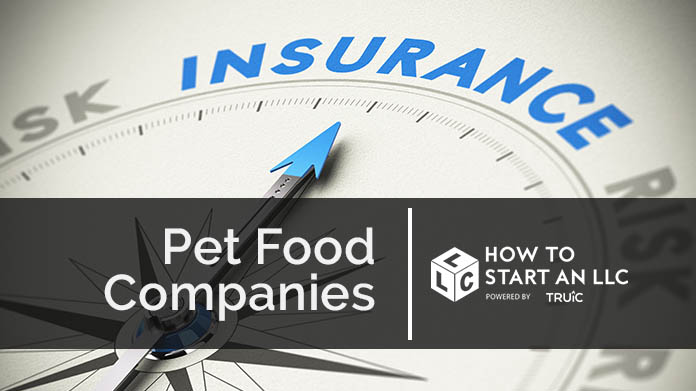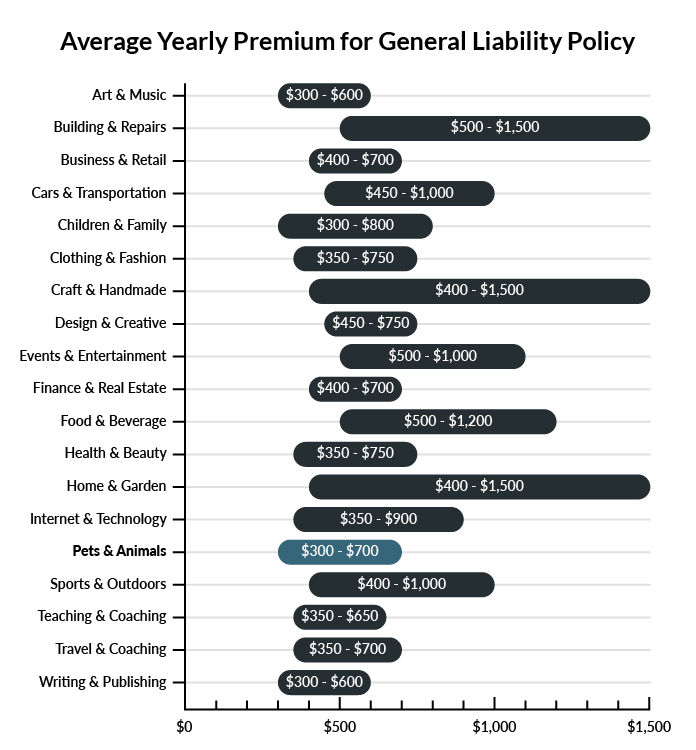Pet Food Business Insurance
Getting insurance for your pet food business is essential.
Pet food businesses need to be protected against things like claims of false advertising, product liability, and breaches of contract.
For example, some pet food sold by your business causes a customer’s dog to fall ill, or you falsely advertise the health benefits of one of your pet food options.
We’ll help you find the most personalized and affordable coverage for your unique business.

Recommended: Ergo Next Insurance is dedicated to matching small businesses with the right policy at the best price.
Best Insurance for a Pet Food Business
General liability insurance is — generally speaking — one of the most important insurance policies for pet food businesses.
Some of the risks general liability insurance covers are:
- Bodily injury
- Property damage
- Medical payments
- Legal defense and judgment
- Personal and advertising injury
Some additional insurance policies that would bolster the protection of your pet food business include:
- Product liability insurance: Protects you against lawsuits filed against you for alleged harm caused by your products.
- Commercial auto insurance: Protects you from the financial losses of accidents involving your business’s vehicles.
- Commercial property insurance: Protects you from bearing the cost of replacing business property that has been damaged by specified events.
Make sure to keep an eye out for the following two types of insurers when shopping for business coverage:
- Traditional brick-and-mortar insurers — Those with physical premises you can visit to chat with company representatives, such as Nationwide or Hiscox.
- Online insurers — Those without physical storefronts that are purely based online, such as Tivly and Ergo Next.
Let’s Find the Coverage You Need
The best insurers design exactly the coverage you need at the most affordable price.
Cost of General Liability Insurance
On average, pet food companies in America spend between $300 – $700 per year for $1 million in general liability coverage.
Compare the average cost of general liability insurance for a pet food business to other professional industries using the graph below.
Several factors will determine the price of your policy. These include your:
- Location
- Deductible
- Number of employees
- Per-occurrence limit
- General aggregate limit
You may be able to acquire general liability insurance at a discounted rate by purchasing it as part of a business owner’s policy (BOP) rather than as a standalone policy.
A BOP is a more comprehensive solution that includes multiple forms of coverage, such as business interruption and property insurance.

Find the Best Rate
Discover the best coverage at the lowest rate in our cheapest business insurance review.
Common Situations That General Liability Insurance May Cover for a Pet Food Business
Example 1: When delivering supplies to your facility, a driver accidentally trips over packages on the floor and sustains multiple injuries. General liability insurance would cover the driver’s medical bills and your legal fees in the event of a lawsuit.
Example 2: While visiting your production facility, a customer reaches into a piece of machinery and severely injures themselves. General liability insurance would cover the customer’s medical bills.
Example 3: When customers find false claims on your company’s packaging and website, they file a class-action lawsuit for false advertising. General liability insurance would cover your legal fees and any damages awarded in a settlement.
Other Types of Coverage Pet Food Businesses Need
While general liability is the most important type of insurance to have, there are several other forms of coverage you should be aware of. Below are some of the most common types of coverage:
Product Liability Insurance
When you sell products to the public, there’s always a chance a customer may file a lawsuit if they believe one of your products caused harm—such as if a contaminated batch of pet food sickens many pets. Product liability insurance would protect your business by covering your legal fees and any damages awarded in a settlement.
Commercial Auto Insurance
Any vehicle you use primarily for business requires commercial auto insurance to protect the vehicle, driver, and others on the road in the event of an accident. This includes any personal cars you may drive while making deliveries because personal auto policies won’t cover work-related accidents. Be sure to select a policy that covers accident-related vehicle repair costs as well as the medical treatment for anyone injured.
Commercial Property Insurance
If your company owns a commercial or industrial facility, you’re responsible for all business-related property housed there in the event of a fire, burglary, or natural disaster. Commercial property insurance would cover the cost of repairing or replacing your equipment, product inventory, and supplies after an accident so you can recover quickly.
Home-Based Business Insurance
If you operate a smaller pet food company and prepare food in your home, check with your homeowners insurance provider to ensure your policy protects you against liability from business-related accidents. If not, consider adding home-based business coverage to your business owner policy (BOP) or your existing home insurance policy.
Additional Steps To Protect Your Business
Although it’s easy (and essential) to invest in business insurance, it shouldn’t be your only defense.
Here are several things you can do to better protect your pet food business:
- Use legally robust contracts and other business documents. (We offer free templates for some of the most common legal forms.)
- Set up an LLC or corporation to protect your personal assets. (Visit our step-by-step guides to learn how to form an LLC or corporation in your state.)
- Stay up to date with business licensing.
- Maintain your corporate veil.
Pet Food Business Insurance FAQ
Yes, absolutely. You will need to first get a quote from an online business insurance provider like Ergo Next Insurance. Ergo Next allows you to then purchase a policy immediately and your coverage will be active within 48 hours.
A typical business owner’s policy includes general liability, business interruption, and commercial property insurance. However, BOPs are often customizable, so your agent may recommend adding professional liability, commercial auto, or other types of coverage to your package depending on your company’s needs.
“Business insurance” is a generic term used to describe many different types of coverage a business may need. General liability insurance, on the other hand, is a specific type of coverage that business owners need to protect their assets.
Yes. It would be very unwise to forego obtaining business insurance before your pet food business gets up and running, as its financial security will be greatly threatened by the multitude of risks it is likely to face.
Additionally, there are even instances in which your pet food business may be obligated by law to own certain policies.
Not necessarily. Certain exceptions may be written directly into your pet food business insurance policy, and some perils may be entirely uninsurable.
Yes, an LLC is meant to create a legal barrier between your business and your personal assets and credit. If you haven’t formed an LLC yet, use our Form an LLC guide to get started.
An LLC doesn’t protect your business assets from lawsuits and liability– that’s where business insurance comes in. Business insurance helps protect your business from liability and risk.